22+ Student Portfolio Examples to Download
Sometimes it is very hard for teachers to gauge the overall performance of their students. The student portfolio is a document that can help teachers gain insight into the understanding of their students.
1. Student Portfolio Template
2. Student Educational Portfolio Example
3. Student Teaching Portfolio
4. Medical Student Portfolios
5. Digital Student Portfolios
6. Student Portfolio Evaluation Form
7. Student Teaching Portfolio Guidelines
8. Creating Student Portfolio Assignments
9. Student Teacher Portfolio Template
10. High School Student Portfolio
11. Student Growth Portfolio Model
12. Sample Student Career Portfolio Checklist
13. Student Portfolio Preparation Guide
14. Student Growth Portfolios
15. Student Portfolio Record
16. Sample Student Portfolio Guidance
17. Student Portfolio Development
18. Student Services Enrollment Portfolio
19. Student Portfolio Guidelines and Requirments
20. Graduating Student Portfolio
21. Sample Student Portfolio Letter
22. Student Portfolio Example
23. Prior Student Learning Assessment Portfolio
What Is a Student Portfolio
A student portfolio is a collection of a student’s works and other documents. The student portfolio will gauge the student’s absorption of the subject matter. When used properly, the teacher can easily identify which students are struggling with their lessons.
How to Make a Student Portfolio
A well-written student portfolio can succinctly define the understanding and knowledge of a student in a specific subject or field. This can be used as a reference for their growth and understanding of the whole field. If you need a reference for the format of a student or teacher portfolio, you may refer to the student portfolio templates, guidelines, examples, and forms in the list above.
1.) Write Your Student Details
Begin by writing down your full name, ID no, and the subject of the portfolio. These details will act as the basic identifier of the student portfolio and will dictate the type of content your portfolio will have.
2.) Add your Accomplishments to the Portfolio
Your portfolio will need to be as detailed as possible. This means you must be able to succinctly add all the achievements you have finished into your portfolio. Just note, that the accomplishments you will add to your portfolio will have to be adjacent and related to the subject matter of your portfolio.
3.) Insert the Necessary Documents or Work into the Portfolio
Your portfolio will need to have the necessary content inserted into the portfolio. The content must be adjacent to the overall subject and theme of the portfolio. For example, a medical student portfolio should have documents or case studies created by the medical student.
4.) Arrange the Documents Coherently in your Student Portfolio
Repeat steps two and three until you feel like you have completed the student portfolio. After you finished adding the necessary information and content, you must arrange all of it coherently and logically. We have to arrange the documents properly so that the reader can easily navigate through your student portfolio.
FAQs
Is there a way to make an e-portfolio easily?
Yes, there are various internet software and services you can utilize and use to create your e-portfolio. This internet software and services include Google Sites, Wix, and Canva, all because of the creative freedom and potential they offer to their consumers. With free membership, you can customize the overall look and the arrangement of the content of your e-portfolio. This means you can easily create your e-portfolio while adding various personal touches to your output.
What are the differences between a portfolio and work experience?
The portfolio is a dedicated document composed of multiple pages of your overall work experience and outputs. For example, a photographer will have a portfolio detailing their accumulated work over their lifetime. A photographer’s portfolio will include titles and photos they have taken during their career. While work experience or resume experience is a specific part of the general resume that indicated a person’s previous work experience with specific details of their previous duties and responsibilities. A portfolio can act as a person’s resume or an addendum to their resume, though this can only be used in specific output-based jobs like graphic design, photography, and writing. Other jobs rely on the inclusion of work experience in the perfect resume to account for their previous job experience and hard and soft skills.
What are the advantages and disadvantages of having a portfolio?
A portfolio allows the artist or author to have a structured and creative collection of their curated outputs. The advantage of having a portfolio is that you can easily present all your work experience and growth in a succinct collection that can serve as proof of the artist’s or author’s skill and style. Not only that but the portfolio can also serve as a reference for how the artist would either write, draw, or photograph their outputs. The free-form nature of the portfolio also presents a disadvantage that occurs during the start of an artist’s portfolio. Not only that but the portfolio can also be filled with personal projects and outputs, meaning that the artist must start their portfolio with their works.
A student portfolio is a document that contains all the hard skills, lessons, and knowledge the student has absorbed during their lesson. The portfolio could come in the form of collated assignments, essays, journals, and case studies that the student had made during their schooling. In conclusion, a well-maintained and accurate portfolio will serve as a good reference point for the current progress of the student.
22+ Student Portfolio Examples to Download
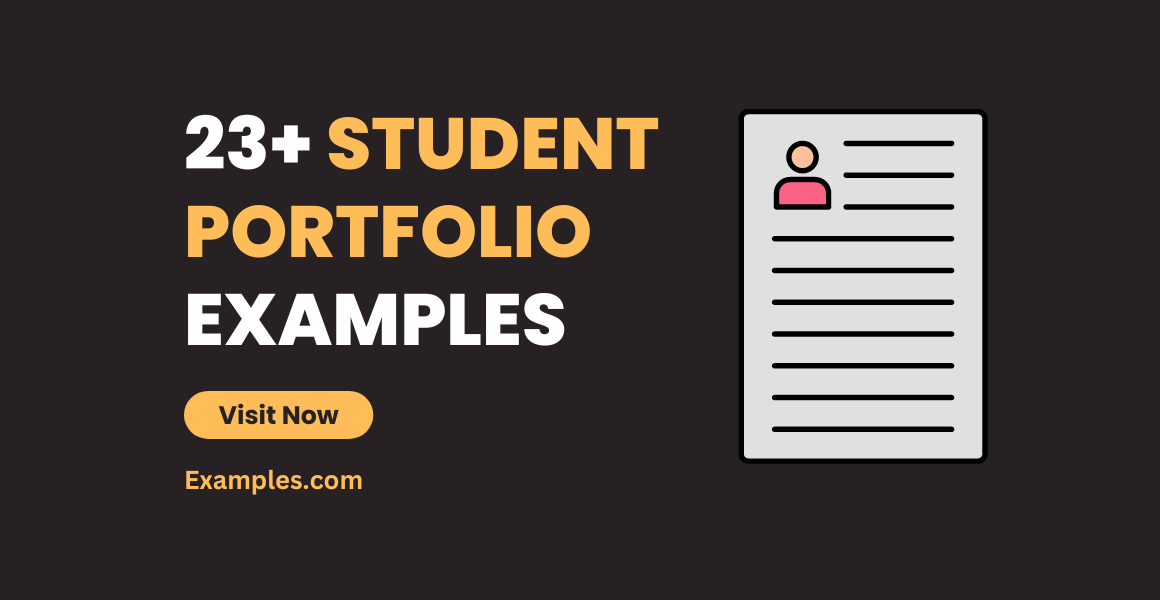
Sometimes it is very hard for teachers to gauge the overall performance of their students. The student portfolio is a document that can help teachers gain insight into the understanding of their students.
1. Student Portfolio Template
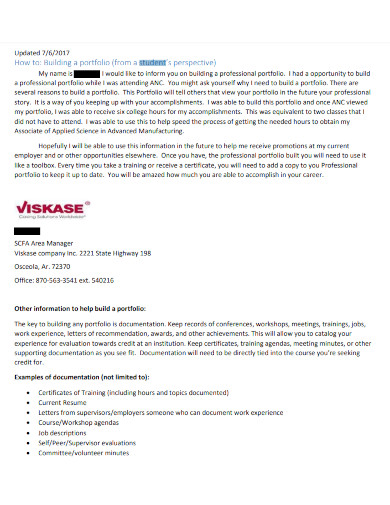
anc.edu
Details
File Format
PDF
Size: 69 KB
2. Student Educational Portfolio Example
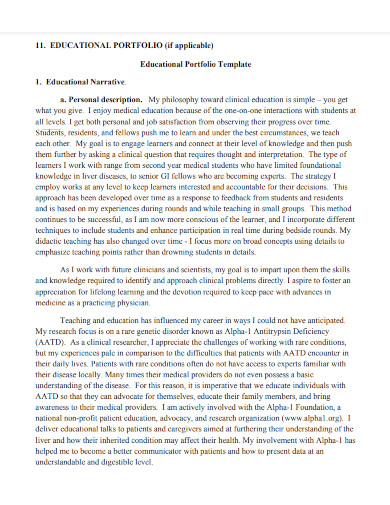
vetmed.ufl.edu
Details
File Format
PDF
Size: 103 KB
3. Student Teaching Portfolio
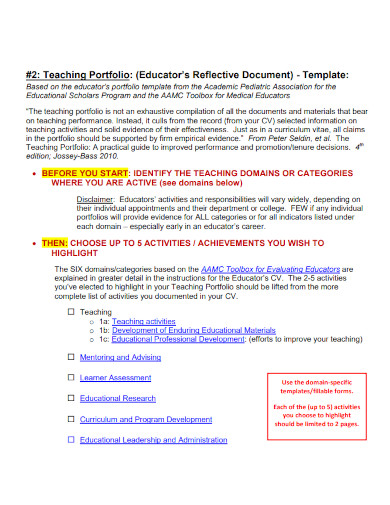
s3.wp.wsu.edu
Details
File Format
PDF
Size: 84 KB
4. Medical Student Portfolios
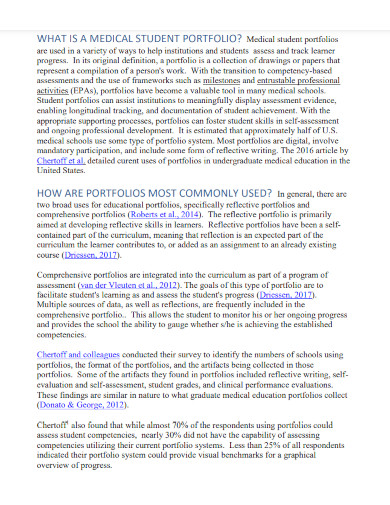
aamc.org
Details
File Format
PDF
Size: 106 KB
5. Digital Student Portfolios
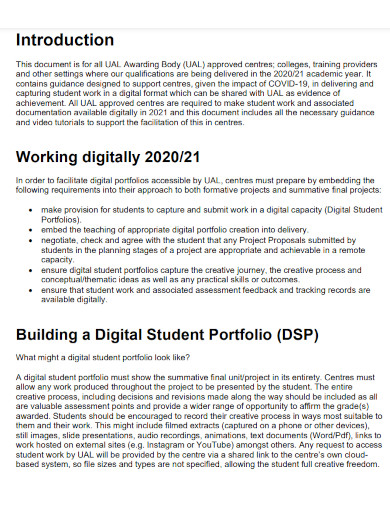
arts.ac.uk
Details
File Format
PDF
Size: 108 KB
6. Student Portfolio Evaluation Form
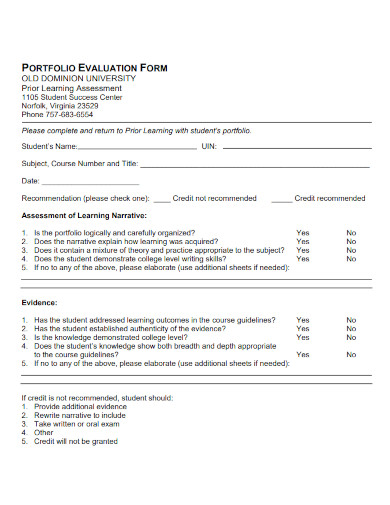
odu.edu
Details
File Format
PDF
Size: 56 KB
7. Student Teaching Portfolio Guidelines
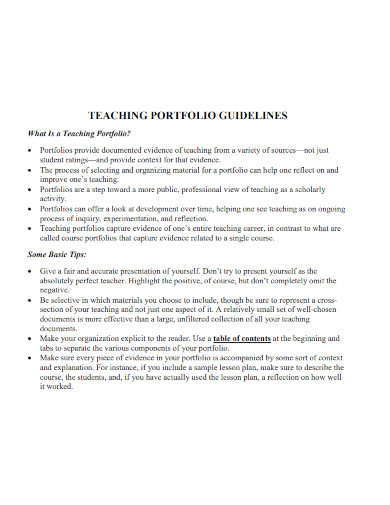
dental.nyu.edu
Details
File Format
PDF
Size: 57 KB
8. Creating Student Portfolio Assignments
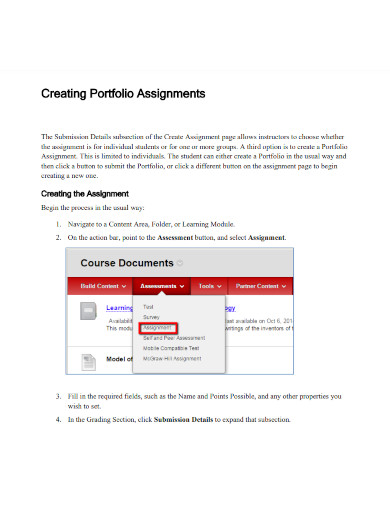
stthom.edu
Details
File Format
PDF
Size: 40 KB
9. Student Teacher Portfolio Template
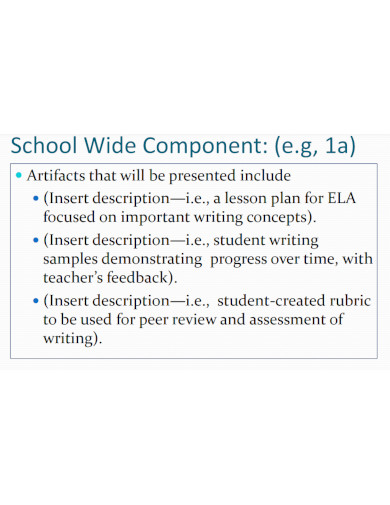
vide.vi
Details
File Format
PDF
Size: 45 KB
10. High School Student Portfolio
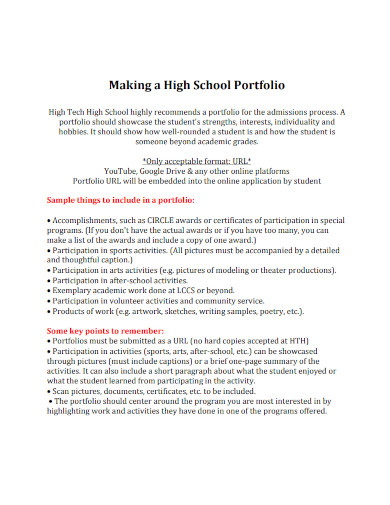
cdn5-ss1.sharpschool.com
Details
File Format
PDF
Size: 69 KB
11. Student Growth Portfolio Model
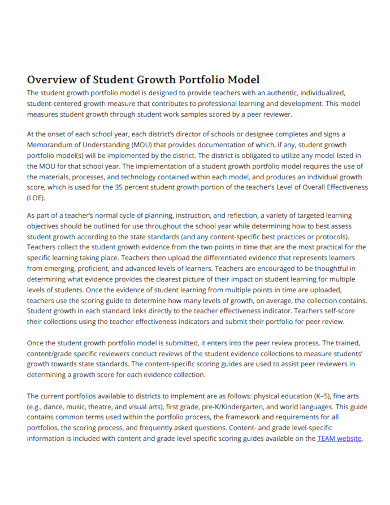
team-tn.org
Details
File Format
PDF
Size: 97 KB
12. Sample Student Career Portfolio Checklist
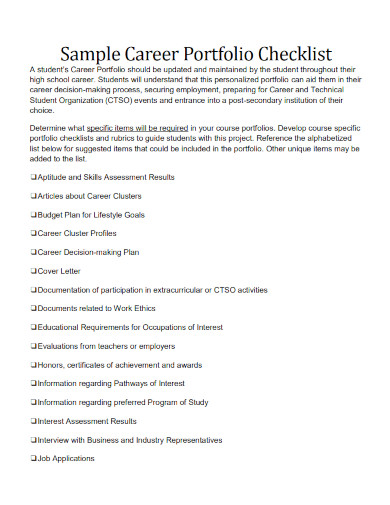
txcte.org
Details
File Format
PDF
Size: 58 KB
13. Student Portfolio Preparation Guide
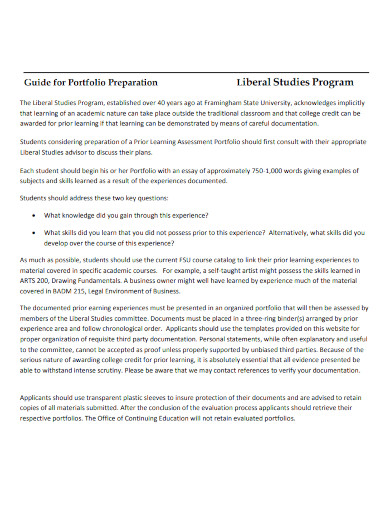
framingham.edu
Details
File Format
PDF
Size: 78 KB
14. Student Growth Portfolios
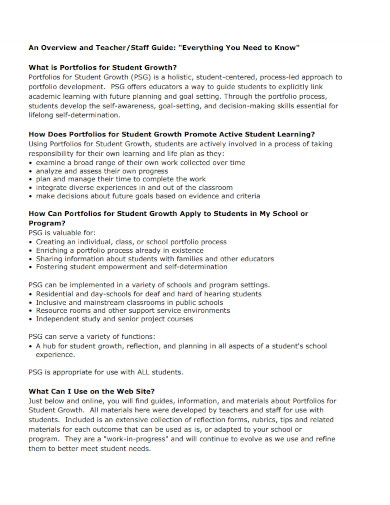
clerccenter.gallaudet.edu
Details
File Format
PDF
Size: 81 KB
15. Student Portfolio Record
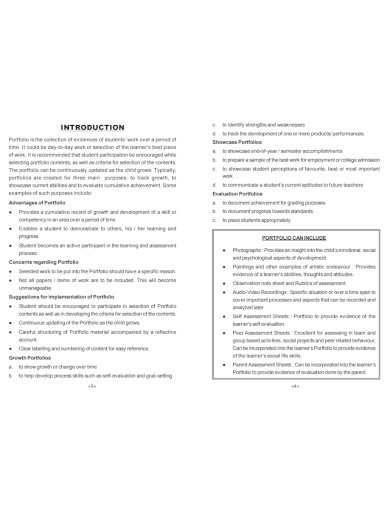
4.imimg.com
Details
File Format
PDF
Size: 42 KB
16. Sample Student Portfolio Guidance
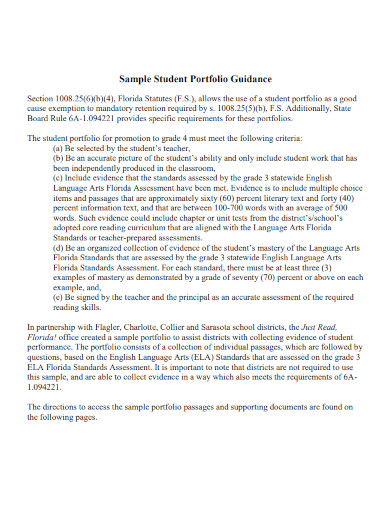
fldoe.org
Details
File Format
PDF
Size: 82 KB
17. Student Portfolio Development
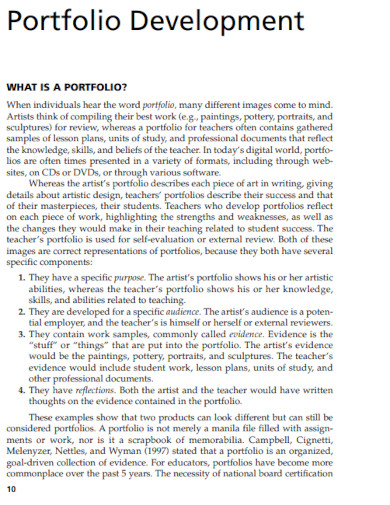
pearsonhighered.com
Details
File Format
PDF
Size: 109 KB
18. Student Services Enrollment Portfolio
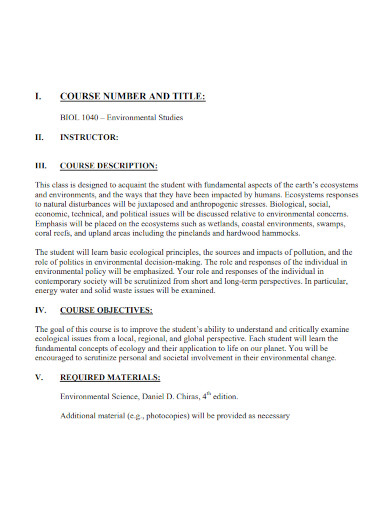
nova.edu
Details
File Format
PDF
Size: 59 KB
19. Student Portfolio Guidelines and Requirments
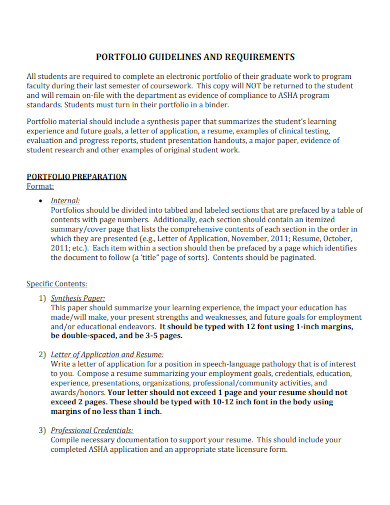
my.enmu.edu
Details
File Format
PDF
Size: 84 KB
20. Graduating Student Portfolio
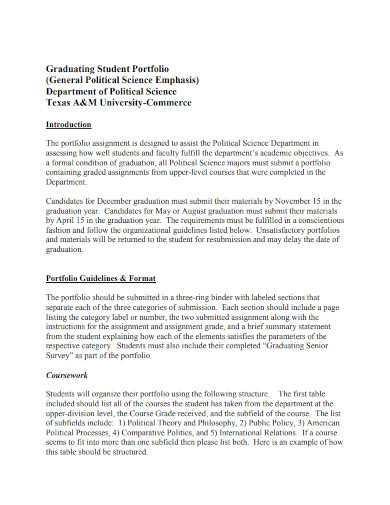
inside.tamuc.edu
Details
File Format
PDF
Size: 74 KB
21. Sample Student Portfolio Letter
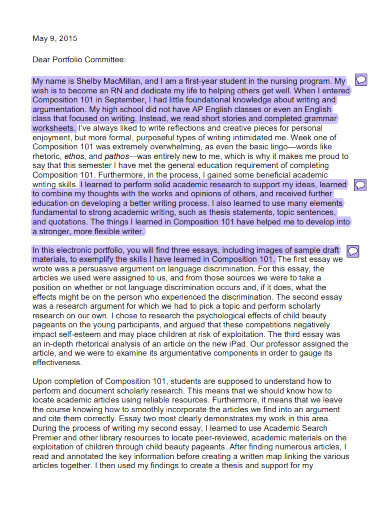
owl.excelsior.edu
Details
File Format
PDF
Size: 119 KB
22. Student Portfolio Example
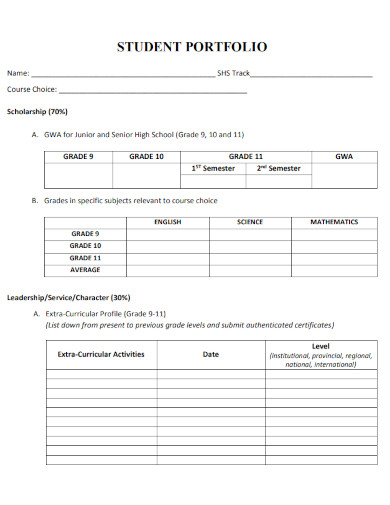
bicol-u.edu.ph
Details
File Format
PDF
Size: 39 KB
23. Prior Student Learning Assessment Portfolio
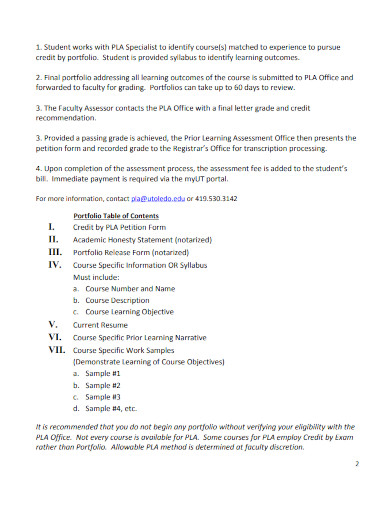
utoledo.edu
Details
File Format
PDF
Size: 61 KB
What Is a Student Portfolio
A student portfolio is a collection of a student’s works and other documents. The student portfolio will gauge the student’s absorption of the subject matter. When used properly, the teacher can easily identify which students are struggling with their lessons.
How to Make a Student Portfolio
A well-written student portfolio can succinctly define the understanding and knowledge of a student in a specific subject or field. This can be used as a reference for their growth and understanding of the whole field. If you need a reference for the format of a student or teacher portfolio, you may refer to the student portfolio templates, guidelines, examples, and forms in the list above.
1.) Write Your Student Details
Begin by writing down your full name, ID no, and the subject of the portfolio. These details will act as the basic identifier of the student portfolio and will dictate the type of content your portfolio will have.
2.) Add your Accomplishments to the Portfolio
Your portfolio will need to be as detailed as possible. This means you must be able to succinctly add all the achievements you have finished into your portfolio. Just note, that the accomplishments you will add to your portfolio will have to be adjacent and related to the subject matter of your portfolio.
3.) Insert the Necessary Documents or Work into the Portfolio
Your portfolio will need to have the necessary content inserted into the portfolio. The content must be adjacent to the overall subject and theme of the portfolio. For example, a medical student portfolio should have documents or case studies created by the medical student.
4.) Arrange the Documents Coherently in your Student Portfolio
Repeat steps two and three until you feel like you have completed the student portfolio. After you finished adding the necessary information and content, you must arrange all of it coherently and logically. We have to arrange the documents properly so that the reader can easily navigate through your student portfolio.
FAQs
Is there a way to make an e-portfolio easily?
Yes, there are various internet software and services you can utilize and use to create your e-portfolio. This internet software and services include Google Sites, Wix, and Canva, all because of the creative freedom and potential they offer to their consumers. With free membership, you can customize the overall look and the arrangement of the content of your e-portfolio. This means you can easily create your e-portfolio while adding various personal touches to your output.
What are the differences between a portfolio and work experience?
The portfolio is a dedicated document composed of multiple pages of your overall work experience and outputs. For example, a photographer will have a portfolio detailing their accumulated work over their lifetime. A photographer’s portfolio will include titles and photos they have taken during their career. While work experience or resume experience is a specific part of the general resume that indicated a person’s previous work experience with specific details of their previous duties and responsibilities. A portfolio can act as a person’s resume or an addendum to their resume, though this can only be used in specific output-based jobs like graphic design, photography, and writing. Other jobs rely on the inclusion of work experience in the perfect resume to account for their previous job experience and hard and soft skills.
What are the advantages and disadvantages of having a portfolio?
A portfolio allows the artist or author to have a structured and creative collection of their curated outputs. The advantage of having a portfolio is that you can easily present all your work experience and growth in a succinct collection that can serve as proof of the artist’s or author’s skill and style. Not only that but the portfolio can also serve as a reference for how the artist would either write, draw, or photograph their outputs. The free-form nature of the portfolio also presents a disadvantage that occurs during the start of an artist’s portfolio. Not only that but the portfolio can also be filled with personal projects and outputs, meaning that the artist must start their portfolio with their works.
A student portfolio is a document that contains all the hard skills, lessons, and knowledge the student has absorbed during their lesson. The portfolio could come in the form of collated assignments, essays, journals, and case studies that the student had made during their schooling. In conclusion, a well-maintained and accurate portfolio will serve as a good reference point for the current progress of the student.

